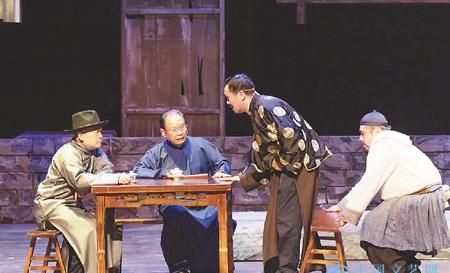The performance and seminar of the opera "No. 41 Sanjiao Street" was held in Wuhan——
How traditional music art innovates and develops

Quyi drama "No. 41 Sanjiao Street" stills Zhu Bofu photo
"Go, I'll take you around the old Hankou..." With the melodious melody of Hubei Xiaoqu, on September 11, the red opera "No. 41 Sanjiao Street" was brilliantly staged at the newly renovated Wuhan Theater. Jiang Kun, chairman of the China Ququ Association and a well-known cross-talk performance artist, as well as relevant responsible persons of the Propaganda Department of the Hubei Provincial Party Committee, the Literary and Art Criticism Center of the China Federation of Literary and Art Circles, the Party History Research Office of the Hubei Provincial Party Committee, the Hubei Provincial Federation of Literature and Literature, the Propaganda Department of the Wuhan Municipal Party Committee, and the Wuhan Municipal Bureau of Culture and Tourism watched the performance together with hundreds of people.
"No. 41 Sanjiao Street" is guided by Hubei Provincial Federation of Literature, Hubei Provincial Qu Association, Wuhan Municipal Bureau of Culture and Tourism, and performed by Wuhan Rap Group. The name of the play originates from the site of the "Eighty-Seven Conference", taking the cover for the smooth convening of the "Eighty-Seven Conference" as the starting point, and the Hubei Commentary, Hubei Big Drum and Hubei Xiaoqu are run through the ups and downs of the plot, and with the realistic sound and light effects in the theater, it shows the revolutionary spirit of the "Chu Family" of the Quyi family with lofty ideals and self-sacrifice.
On the stage, the Qu yi family fought with the patrol police of the reactionary government, and finally sacrificed heroically, and through "time and space dialogue", they came to the new world they fought for- the Dahankou in the 21st century. Offstage, many viewers immersed themselves in the plot and shed tears. "Music and art are suitable for all ages, so that the family can also accept the influence of art and understand the life at that time." At the scene, many elderly people came to the theater with their children. Director Xu Yulong introduced, "This drama has achieved a leap from quyi to quyi drama, all the main creative staff have poured a lot of effort, and the actors in the performance have always been very emotional, reaching the audiovisual enjoyment that allows the audience to listen to the music and watch the play." In the play, Yao Liling, a national second-level actor who plays "Meimei", admitted that every time she read the script and pondered the psychology of the characters, her heart was also touched.
On the morning of September 12, the seminar on "No. 41 Sanjiao Street" was held. More than 50 experts and scholars, including Jiang Kun, Yang Xiaoxue, deputy director of the Literary and Art Criticism Center of the China Federation of Literary and Art Circles and deputy editor-in-chief of the China Literary and Art Review, Qiu Zhengang, director of the Theoretical Supplement Department of China Art Newspaper, He Guangyao, director of the Party History Research Office of the Hubei Provincial Party Committee, lu Ming, vice chairman of the Hubei Provincial Federation of Literary and Art Circles and chairman of the Hubei Provincial Ququ Association, and other experts and scholars participated in the exchange and discussion. The participating experts spoke highly of the theme selection, arrangement level and social effects of the opera "No. 41 Sanjiao Street". They also conducted in-depth exchanges and discussions on "the creation of repertoire on the theme of party history," "the transmutation relationship between quyi and quyi opera," "the development direction of dialect music and art," and "the cultivation of young quyi actors."
"The whole play has characteristics in creativity, pursuit in art, and vivid performance." Jiang Kun said that when creating quyi dramas, it is necessary to further increase the sense of urgency of the plot advancement, use more streamlined quyi techniques to attract the attention of the audience, take the people as the center, strengthen the combination of works with the times, use more colloquial language, cooperate with sound and painting effects, and let the people intuitively feel the drastic changes of the times. Yang Xiaoxue believes that the play has both comedic laughs and elements of the main drama, giving full play to the regional characteristics and dialect advantages of quyi, and playing a finishing touch to the repertoire between jumping in and out. Qiu Zhengang believes that "out of the people, out of the book, take the right path" is the responsibility of the qu artist, the young actors in the play perform well, played a role in cultivating and exercising young music artists, and can further excavate the inner monologues of the positive and negative characters when arranging, and strengthen the expressiveness. He Guangyao said: "No. 41 Sanjiao Street" is a good drama on the theme of party history, which integrates qu art with elements of party history, expresses large themes through "small gaps," embodies the political responsibility of literary and art workers, and achieves good social results.
Source: China Art News